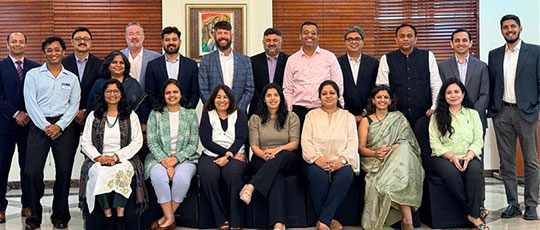For WorldatWork Members
- Get the Most Out of Your AI Investment, Journal of Total Rewards article
- TR Is Key to Successfully Integrating AI and Work, Journal of Total Rewards article
- 3 Sales Compensation Challenges that AI Can Help Tackle, Workspan Magazine article
For Everyone
- Total Rewards ’25, conference
- How Will AI Impact TR’s Roles and Strategies Over the Next 5 Years? Workspan Daily article
- How Artificial Intelligence Risks Directly Apply to Total Rewards, Workspan Daily article
- How AI Is Transforming the Total Rewards Landscape, Workspan Daily article
- Mini-study: Emerging Insights on AI in Total Rewards, research
When it comes to the utilization of artificial intelligence (AI) within total rewards (TR) applications, Joan Gliboff, perhaps more than anymore, knows there is no “magic pill.” Spending the past 13 years of her professional journey at global biopharmaceutical company Bristol Myers Squibb gives her plenty of insight on that. Her unique background and vantage point, though, can be applied to how TR can approach AI and other emerging technologies — with research, study, testing, data and analysis.
In her role as a partner for global compensation programs at Bristol Myers Squibb (BMS), Gliboff leads a team of functional experts who support all international corporate sites. She also leads strategic global compensation projects.
Gliboff is a featured panelist in a session titled “Harnessing AI for Total Rewards: Success Stories and Strategies One Year Later” at WorldatWork’s Total Rewards ’25 conference, coming up on May 19-21 in Orlando, Fla.
Workspan Daily Editor Paul Arnold recently connected with this industry leader to discuss how AI has transformed the way BMS and other organizations approach HR and TR.
Check out other Workspan Daily articles from Total Rewards ’25:
- Might a Sales Mindset Be Your Key to Total Rewards Success?
- The Monumental Mission of Meaningful Mentorships
- Proactive TR Pros See ‘Train’ of Change Coming, Take Steps to Act
- The Keys to Creativity and Driving Innovative Total Rewards
- The Pros and Cons of Giving Managers Discretion on Merit Increases
- Using Analytics, Innovative Framework to Transform HR/Total Rewards
- How An Industry Leader Sees Technology Transforming Total Rewards
- Boldyn Networks Offers a Bolder Approach to Employee Well-Being
Arnold: From your perspective, what do you see as the current state of AI in the total rewards community — in terms of interest, exploration and implementation? Where are we on this journey?
Gliboff: I believe there is significant interest and exploration of possibilities. For example, we can now leverage chatbots to answer straightforward employee questions about program eligibility and provide links to vendors or program documents. Additionally, there is an opportunity to train AI to perform more complex tasks, such as recommending a salary or reading a job description and suggesting the appropriate job level.
Arnold: In considering the TR function’s roles, responsibilities and accountabilities, is there a sweet spot where AI may fit best?
Gliboff: AI is already assisting with responses to employee inquiries, and it will eventually manage most operational or administrative tasks, as long as there are clear program guidelines and rules to follow.
“The compensation team found that investment in building a solid job architecture foundation enhances our ability to leverage AI.”
— Joan Gliboff, global compensation leader, Bristol Myers Squibb
Arnold: Where is Bristol Myers Squibb in terms of its HR/TR adoption of AI?
Gliboff: We leverage AI in several ways. Our HR team uses a chat assistant to handle first-level requests from employees and managers, providing recommended responses and links to relevant BMS sites. Managers have access to a chat assistant on a manager-only site that answers questions about programs and policies, with links for additional details. Additionally, we have an online site for all employees that offers information and links on general BMS topics as well as HR-related information.
The compensation team found that investment in building a solid job architecture foundation enhances our ability to leverage AI. By organizing all our jobs into job families and applying a consistent approach to leveling roles, we were able to use AI to create high-level job descriptions — including accountabilities, qualifications and skills — for all non-executive jobs. This information is utilized in an AI-enabled talent tool that matches required skills in job descriptions to employee skills reported in their profiles. The result is an improved internal recruiting process and the ability to provide career opportunities to our employees.
Furthermore, our job architecture includes job-based salary ranges in all countries where we operate. We feel this prepares us to leverage AI in the future for organizational design and workforce planning, as well as to support managers in making pay decisions.
Arnold: How do you see AI evolving within your organization over the next year or so?
Gliboff: I believe we will see an expansion in the tasks AI handles and an increase in the accuracy and relevance of the information it provides in response to inquiries. For example, total rewards may use AI to draft program brochures and administrative guidelines. I also think employees and managers will develop greater trust in these tools over time.
Arnold: What excites you the most — and/or perhaps gives you pause — about emerging technologies such as AI?
Gliboff: AI offers a significant opportunity to automate routine tasks, freeing up employees for more interesting and valuable work. Data-driven insights will identify opportunities that might have been previously overlooked, adding business value. However, human intervention will still be necessary. For example, while AI can recommend a job level by reviewing a job description and comparing it to job-leveling criteria, it may not fully consider the organizational context. I do not believe AI can replace all human tasks, so it is important to ensure that our leaders and employees have realistic expectations.
Arnold: For HR/TR leaders who may be interested in dipping their toes in the AI waters, what is one piece of advice, based upon your experiences?
Gliboff: You must invest time in creating, updating and maintaining relevant and accurate source data. The quality of the output depends on the quality of the source information.
Editor’s Note: Additional Content
For more information and resources related to this article, see the pages below, which offer quick access to all WorldatWork content on these topics:








